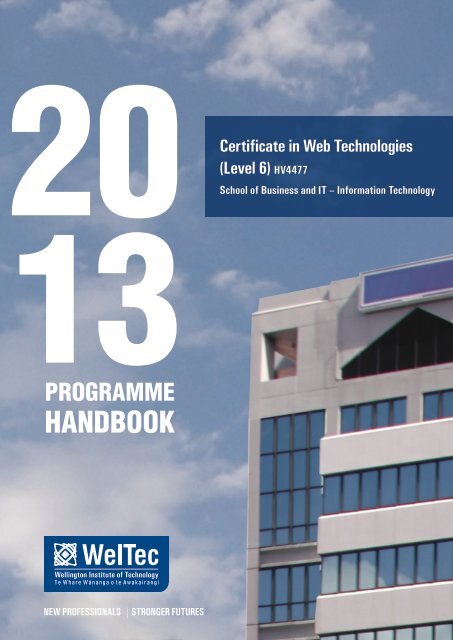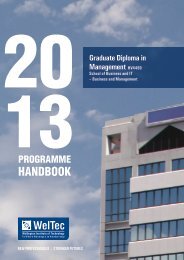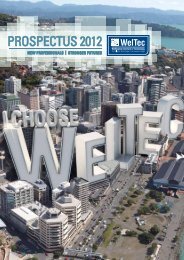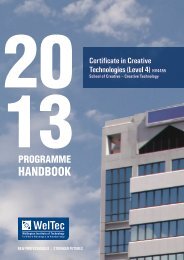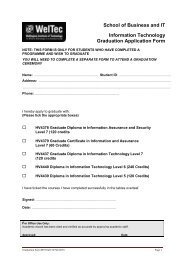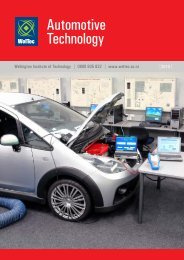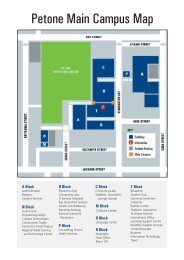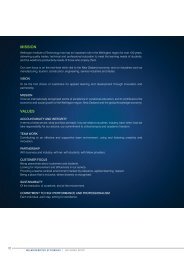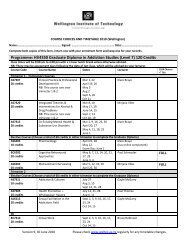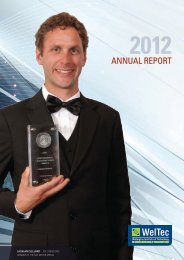1 programme handbook - Wellington Institute of Technology
1 programme handbook - Wellington Institute of Technology
1 programme handbook - Wellington Institute of Technology
- No tags were found...
You also want an ePaper? Increase the reach of your titles
YUMPU automatically turns print PDFs into web optimized ePapers that Google loves.
Certificate in Web Technologies<br />
(Level 6) HV4477<br />
School <strong>of</strong> Business and IT – Information <strong>Technology</strong><br />
PROGRAMME<br />
HANDBOOK
Disclaimer<br />
The information contained in this Programme Handbook is correct at the time <strong>of</strong> publication. However, <strong>programme</strong>s and courses<br />
are subject to change and WelTec reserves the right to change the content, location or method <strong>of</strong> presentation <strong>of</strong> any<br />
<strong>programme</strong> or course, and update this Programme Handbook accordingly at any time. The online edition <strong>of</strong> the Programme<br />
Handbook is the <strong>of</strong>ficial Programme Handbook.<br />
Copyright © 2013<br />
<strong>Wellington</strong> <strong>Institute</strong> <strong>of</strong> <strong>Technology</strong> owns copyright in this <strong>programme</strong> <strong>handbook</strong>. No part may be reproduced, stored in a retrieval<br />
system or <strong>of</strong>fered for resale without WelTec’s written permission.<br />
<strong>Wellington</strong> <strong>Institute</strong> <strong>of</strong> <strong>Technology</strong> - 2013 Programme Handbook February 2013<br />
HV4458 Certificate in Web <strong>Technology</strong> (Level 6)
School <strong>of</strong> Business and IT<br />
PROGRAMME HANDBOOK 2013<br />
HV4458 Certificate in Web <strong>Technology</strong> (Level 6)<br />
<strong>Wellington</strong> <strong>Institute</strong> <strong>of</strong> <strong>Technology</strong> - 2013 Programme Handbook<br />
HV4458 Certificate in Web <strong>Technology</strong> (Level 6)<br />
Publication Date: 4 March 2013
HAERE MAI<br />
Whai korōria ki te atua i runga rawa<br />
Maunga rongo ki te whenua<br />
Whakaaro pai ki ngā Tangata Katoa.<br />
Tena Koutou Katoa,<br />
Tēnei te mihi atu ki a koutou ngā Tauira o<br />
Te Whare Wananga o Te Awakairangi.<br />
Nau mai haere mai ki tēnei Wananga o tātou.<br />
Kia kaha koutou ki te whai mātauranga i tēnei tau, ki te whakarongo<br />
hoki ki ō koutou kaiako.<br />
“Whāia te kotahitanga o te wairua.<br />
Mā te rangimārie me te aroha e paihere”<br />
(pursue unity <strong>of</strong> spirit, which is bound together by peace and aroha)<br />
He mihi nui tēnei kia koutou ngā Tauira o<br />
Te Whare Wananga o Te Awakairangi.<br />
Nau mai haere mai ki tēnei Whare Wananga o tātou.<br />
<strong>Wellington</strong> <strong>Institute</strong> <strong>of</strong> <strong>Technology</strong> - 2013 HV4458 Programme Handbook February 2013<br />
Overview and Programme Specific Information Page 4
CONTENTS<br />
HAERE MAI............................................................................................................................................. 4<br />
CHIEF EXECUTIVE’S WELCOME ......................................................................................................... 6<br />
EXECUTIVE DEAN’S WELCOME .......................................................................................................... 7<br />
INTRODUCTION ..................................................................................................................................... 7<br />
ACADEMIC CALENDAR - 2013 ............................................................................................................. 8<br />
STAFF ................................................................................................................................................... 10<br />
AIMS ...................................................................................................................................................... 11<br />
GRADUATE PROFILE .......................................................................................................................... 11<br />
CAREERS ............................................................................................................................................. 11<br />
STAIRCASING ...................................................................................................................................... 11<br />
PROGRESS THROUGH THE PROGRAMME ..................................................................................... 11<br />
GRADUATION CRITERIA .................................................................................................................... 11<br />
LEARNING AND TEACHING................................................................................................................ 12<br />
ASSESSMENT PROCEDURES ........................................................................................................... 13<br />
Assessment Rationale ................................................................................................................ 14<br />
Assessment Schedule ................................................................................................................ 14<br />
Format Of Assessments ............................................................................................................. 15<br />
Theory Assessment .................................................................................................................... 15<br />
Assessment Cover Sheets ......................................................................................................... 15<br />
Submitting Assessment And Assignment Work ......................................................................... 15<br />
Arranging for Late Submission Of Assessments ........................................................................ 15<br />
Applying For An Extension Beyond The Course End Date ........................................................ 15<br />
Penalty for Unarranged Late Submission ................................................................................... 16<br />
Assessment Results Notification ................................................................................................ 16<br />
Challenging Assessment Decisions ............................................................................................ 16<br />
RISK MANAGEMENT, SAFETY AND HEALTH ................................................................................... 16<br />
ATTENDANCE MATTERS .................................................................................................................... 16<br />
PERSONAL EQUIPMENT AND MATERIALS ...................................................................................... 17<br />
REQUIRED TEXTS ............................................................................................................................... 17<br />
INFORMED CONSENT AND CONFIDENTALITY................................................................................ 17<br />
PROGRAMME EVALUATION .............................................................................................................. 17<br />
COURSE DESCRIPTORS .................................................................................................................... 18<br />
<strong>Wellington</strong> <strong>Institute</strong> <strong>of</strong> <strong>Technology</strong> - 2013 HV4458 Programme Handbook February 2013<br />
Overview and Programme Specific Information Page 5
WELCOME TO WELTEC<br />
CHIEF EXECUTIVE’S WELCOME<br />
Greetings, Kia Ora, Tal<strong>of</strong>a Lava, Kia Orana, ni sa Bula Vinaka<br />
Kaise Hai, Sat sri akal, Malo e Lelei, Halo Olgeta, Taloha ni<br />
Marhaba, Bozu, Fakal<strong>of</strong>a Lahi Atu, Annyong haseyo, Ni hao, Namaste<br />
Welcome to <strong>Wellington</strong> <strong>Institute</strong> <strong>of</strong> <strong>Technology</strong><br />
Te Whare Wananga o te Awakairangi<br />
In selecting to learn at <strong>Wellington</strong> <strong>Institute</strong> <strong>of</strong> <strong>Technology</strong> (WelTec), you have chosen a place <strong>of</strong><br />
learning that aims to give you not only the working lifestyle you want, but also, a friendly and<br />
comfortable environment where you can feel at home.<br />
By enrolling at WelTec, you are setting out on a learning journey. What you learn and for what<br />
purpose, are your decisions to make. We want to walk beside you as your coach, partner and<br />
mentor; <strong>of</strong>fering support, facilities, opportunities, tools and information to help you reach your<br />
goals.<br />
When you enrol, you will find that the majority, or maybe all, <strong>of</strong> your courses take place on one<br />
campus. Whether your classes are held at our <strong>Wellington</strong> sites, in Auckland, Christchurch, any <strong>of</strong> our<br />
Petone or other sites, all are your campuses.<br />
With your Student ID card, all services and facilities are there for you to use.<br />
Please let us know if you have any queries or needs we haven’t yet met. Best wishes for a happy and<br />
successful year.<br />
Linda Sissons (Dr)<br />
Chief Executive<br />
<strong>Wellington</strong> <strong>Institute</strong> <strong>of</strong> <strong>Technology</strong> - 2013 HV4458 Programme Handbook February 2013<br />
Overview and Programme Specific Information Page 6
EXECUTIVE DEAN’S WELCOME<br />
Welcome to WelTec – your place for learning. As an institute <strong>of</strong> learning you, as a student, are our<br />
key priority.<br />
All staff at WelTec have one primary focus and that is to help facilitate your learning. As you<br />
progress through your studies please take the opportunity to access the facilities and staff support<br />
available.<br />
Your success is our success.<br />
Julia Hennessy (MEd, MMgt, PGDipHSM, BA, DipN)<br />
Executive Dean<br />
INTRODUCTION<br />
This Programme Handbook is intended to provide information relating to the <strong>programme</strong> you<br />
are enrolled in with WelTec. There is also an associated WelTec A-Z site that has other<br />
helpful information regarding systems and processes that operate at WelTec.<br />
The most up-to-date version <strong>of</strong> this Programme Handbook and the WelTec A-Z general<br />
information is online at:<br />
http://www.weltec.ac.nz/SH/HV4458.pdf<br />
WelTec’s policies that apply to students and this Programme Handbook are located at:<br />
http://www.weltec.ac.nz/SH/Policy/<br />
<strong>Wellington</strong> <strong>Institute</strong> <strong>of</strong> <strong>Technology</strong> - 2013 HV4458 Programme Handbook February 2013<br />
Overview and Programme Specific Information Page 7
TRIMESTER ONE 2013<br />
TRIMESTER TWO 2013<br />
ACADEMIC CALENDAR - 2013<br />
HV4458 Certificate in Web Technologies (Level 6)<br />
Teaching<br />
Period<br />
Week<br />
No<br />
Monday<br />
date<br />
5 28-Jan<br />
MON TUE WED THU FRI SAT SUN<br />
Auckland<br />
Anniversary<br />
6 4-Feb Waitangi Day<br />
7 11-Feb<br />
Orientation<br />
Trades<br />
Academy (1)<br />
Orientation<br />
Maori<br />
Students<br />
Orientations:<br />
Auckland;<br />
Trades<br />
Academy (2)<br />
Orientation<br />
Auckland<br />
Orientations:<br />
Christchurch;<br />
Youth<br />
Guarantee<br />
8 18-Feb<br />
9 25-Feb<br />
Mihi<br />
Whakatau;<br />
Orientation<br />
Petone<br />
Orientation<br />
Church St,<br />
Cuba St<br />
<strong>Wellington</strong><br />
Orientation<br />
Petone<br />
International<br />
Orientation<br />
Petone<br />
10 4-Mar Tri 1 Starts<br />
11 11-Mar Tri 1 <br />
12 18-Mar<br />
13 25-Mar Tri 1+2 Easter Break<br />
Easter<br />
Break<br />
Easter<br />
Break<br />
14 1-Apr Easter Break Easter Break<br />
Break Break Break<br />
15 8-Apr<br />
16 15-Apr<br />
17 22-Apr ANZAC Day<br />
18 29-Apr<br />
19 6-May<br />
20 13-May<br />
21 20-May<br />
22 27-May<br />
23 3-Jun<br />
Queen’s<br />
Birthday<br />
Tri 1 <br />
24 10-Jun Study Break Study Break Study Break Study Break Study Break<br />
25 17-Jun<br />
26 24-Jun<br />
Exam Week<br />
1<br />
Exam Week<br />
2<br />
Exam Week<br />
1<br />
Exam Week<br />
2<br />
Exam Week<br />
1<br />
Exam Week<br />
2<br />
Exam Week<br />
1<br />
Exam Week<br />
2<br />
Exam Week<br />
1<br />
Tri 1 Ends<br />
27 1-Jul Break Break Break Break Break<br />
28 8-Jul Break Break Break Break<br />
Tri 1 Results<br />
Completed<br />
29 15-Jul Tri 2 Starts<br />
30 22-Jul Tri 2 <br />
31 29-Jul Tri 1+2 <br />
32 5-Aug Tri 2+3 <br />
33 12-Aug<br />
Graduation<br />
<strong>Wellington</strong><br />
34 19-Aug<br />
35 26-Aug Break Break Break Break Break<br />
36 2-Sep<br />
37 9-Sep<br />
38 16-Sep<br />
39 23-Sep<br />
<strong>Wellington</strong> <strong>Institute</strong> <strong>of</strong> <strong>Technology</strong> - 2013 HV4458 Programme Handbook February 2013<br />
Overview and Programme Specific Information Page 8
TRIMESTER THREE – 2013<br />
Teaching<br />
Period<br />
Week<br />
No<br />
Monday<br />
date<br />
40 30-Sep<br />
41 7-Oct<br />
MON TUE WED THU FRI SAT SUN<br />
42 14-Oct Tri 2 <br />
43 21-Oct Study Break Study Break Study Break Study Break Study Break<br />
44 28-Oct Labour Day<br />
45 4-Nov<br />
Exam Week<br />
2<br />
46 11-Nov Tri 3 Starts<br />
47 18-Nov<br />
Exam Week<br />
1<br />
Exam Week<br />
2<br />
Exam Week<br />
1<br />
Exam Week<br />
2<br />
Exam Week<br />
1<br />
Exam Week<br />
2<br />
Exam Week<br />
1<br />
Tri 2 Ends<br />
Canterbury<br />
Anniversary<br />
Tri 2<br />
Tri2 Results<br />
Completed<br />
48 25-Nov<br />
49 2-Dec<br />
50 9-Dec<br />
51 16-Dec<br />
52 23-Dec WelTec closed for Christmas<br />
1<br />
30-Dec-<br />
13<br />
2 6-Jan-14<br />
3 13-Jan<br />
Tri 2+3 <br />
4 20-Jan<br />
5 27-Jan<br />
<strong>Wellington</strong><br />
Anniversary<br />
Auckland<br />
Anniversary<br />
WelTec closed for New Year Holidays<br />
6 3-Feb<br />
Tri 3 Waitangi Day<br />
7 10-Feb<br />
8 17-Feb<br />
9 24-Feb Tri 3 Ends<br />
10 3-Mar Tri 1 Starts<br />
11 10-Mar<br />
Tri 3 Results<br />
Completed<br />
Enr period Last date to change or withdraw in that enrolment period with refund<br />
Enr period<br />
Last date to withdraw (75% <strong>of</strong> course enrolment period)<br />
The up-to-date, day-to-day and week-by-week timetables are located at:<br />
http://timetable.weltec.ac.nz/.<br />
<strong>Wellington</strong> <strong>Institute</strong> <strong>of</strong> <strong>Technology</strong> - 2013 HV4458 Programme Handbook February 2013<br />
Overview and Programme Specific Information Page 9
STAFF<br />
Faculty Executive Dean:<br />
Julia Hennessy<br />
School:<br />
Business and IT<br />
Head <strong>of</strong> School:<br />
Mick Jays<br />
Phone/extension 670<br />
E-mail<br />
mick.jays@weltec.ac.nz<br />
Associate Head <strong>of</strong> School: TBA<br />
Phone/extension<br />
TBA<br />
E-mail<br />
TBA<br />
School Business Administrator: Michele Carroll<br />
Phone/extension 515<br />
E-mail<br />
Michele.Carroll@weltec.ac.nz<br />
Staff Member Qualifications Position Email Address<br />
ALLSOBROOK, PhD SASM Anthony.Allsobrook@weltec.ac.nz<br />
Anthony Dr<br />
ARMSTRONG, Ian MComm, BAppIS, DipAdEd, PASM Ian.Armstrong@weltec.ac.nz<br />
CCNP, CCAI, MCTS, NZCE<br />
BEDI, Sunil<br />
PGCertBusAd, BIT,<br />
ASM Sunil.Bedi@weltec.ac.nz<br />
DipAirTechOps<br />
BRYANT, Paul<br />
BSocSc, CCAI, CCNP, MCSE, SASM Paul.Bryant@weltec.ac.nz<br />
DipAdEdTrain<br />
EALES, Andrew MSc, MMus SASM Andrew.Eales@weltec.ac.nz<br />
ECHANO, Jeff BSc, CertSE ASM Jeff.Echano@weltec.ac.nz<br />
EYES, David CompTIA A+ ASM David.Eyes@weltec.ac.nz<br />
FARRELL, Mariki BA, CertAdultEd SASM Mariki.Farrell@weltec.ac.nz<br />
GOULD, John<br />
PGDipAppSci, BSc, NZCE, SASM John.Gould@weltec.ac.nz<br />
DipAdEd<br />
HUNTER, Ian MSc, NZCE, AdvTC, A/B PASM Ian.Hunter@weltec.ac.nz<br />
JEON, Terry<br />
MKnowMngt, DipBC, BSc SASM Terry.Jeon@weltec.ac.nz<br />
(Hons)<br />
KEATS, Evan BA, CertAdEd, NZCE ASM Evan.Keats@weltec.ac.nz<br />
McKINLAY, Steve MA, BBus SASM Steve.McKinlay@weltec.ac.nz<br />
MANUELI, Kerese Dr PhD, PGDipComp SASM Kerese.Manueli@weltec.ac.nz<br />
MORRIS, Tim<br />
DipSysTech, DipCompEng, ASM Tim.Morris@weltec.ac.nz<br />
DiplComp, NZCE, A+, Network+<br />
OWEN, Rhys BSc (Hons) SASM Rhys.Owen@weltec.ac.nz<br />
RADEMEYER, Corrie BA ASM Corrie.Rademeyer@weltec.ac.nz<br />
SANTOS, Aristotle BSc, AutoCADD, MCP, Power ASM Aristotle.Santos@weltec.ac.nz<br />
Electronics Certification<br />
SUDHAKAR, Clement MSc, BE ASM Clement.Sudhakar@weltec.ac.nz<br />
SUTCLIFFE, Robert PGDipInfoSysMngt, BSc, CAT SASM Robert.Sutcliffe@weltec.ac.nz<br />
TROWER, Leonie BSW, DipAdEd, DipICT SASM Leonie.Trower@weltec.ac.nz<br />
TULLOCK, Nick MCP, NZCE SASM Nick.Tullock@weltec.ac.nz<br />
<strong>Wellington</strong> <strong>Institute</strong> <strong>of</strong> <strong>Technology</strong> - 2013 HV4458 Programme Handbook February 2013<br />
Overview and Programme Specific Information Page 10
AIMS<br />
The aim <strong>of</strong> the Certificate in Web Technologies is to provide students with skills to produce<br />
websites that match and enhance business processes, including e-commerce. Students will<br />
be able to set up scripts and databases and build web templates.<br />
The aim <strong>of</strong> the <strong>programme</strong> is to provide an opportunity for students with:<br />
a) The Diploma in Information <strong>Technology</strong> (Level 5)<br />
or<br />
b) Equivalent qualification<br />
or<br />
c) Relevant IT industry experience.<br />
GRADUATE PROFILE<br />
The Certificate in Web Technologies (Level 6) enables students to develop advanced skills<br />
in both the Ecommerce and web disciplines.<br />
Successful graduates will move into the workforce and primarily fill one <strong>of</strong> the roles listed:<br />
• Web Designer<br />
• Web Administrator<br />
• Web Site Developer.<br />
CAREERS<br />
• Web Designer<br />
• Web Administrator<br />
• Web Developer.<br />
STAIRCASING<br />
Graduates <strong>of</strong> the Certificate in Web Technologies may progress onto the Bachelor <strong>of</strong><br />
Information <strong>Technology</strong> or enter the industry.<br />
PROGRESS THROUGH THE PROGRAMME<br />
The normal progression through the Certificate in Web Technologies is to obtain 60 credits<br />
at Level 6 study over two trimesters part time.<br />
GRADUATION CRITERIA<br />
To be awarded the Certificate in Web Technologies (Level 6) the student shall have to<br />
meet the minimum requirement <strong>of</strong> 60 credits as follows:<br />
Successfully complete the three Compulsory courses:<br />
<br />
<br />
<br />
IT6261 – E-Commerce Web Application Development<br />
IT6262 – Web Site Scripting Foundation<br />
IT5176 – Web Media<br />
Successfully complete one <strong>of</strong> the following Elective courses:<br />
<strong>Wellington</strong> <strong>Institute</strong> <strong>of</strong> <strong>Technology</strong> - 2013 HV4458 Programme Handbook February 2013<br />
Overview and Programme Specific Information Page 11
IT6276 – Web <strong>Technology</strong> Integration<br />
IT7381 – Rich Internet Applications<br />
Course<br />
Number<br />
Course Title Level Credits Compulsory (C)<br />
Elective (E)<br />
IT6262<br />
Web Site Scripting<br />
Foundation<br />
6 15 C<br />
IT5176 Web Media 5 15 C<br />
IT6261<br />
E Commerce Web<br />
Application Development<br />
6 15 C<br />
IT6276 Web <strong>Technology</strong> Integration 6 15 E<br />
IT7381 Rich Internet Applications 7 15 E<br />
Pre- (P) or<br />
Co-(C)<br />
Requisites<br />
Level 6 web<br />
scripting,<br />
programming<br />
or equivalent<br />
industry<br />
experience<br />
LEARNING AND TEACHING<br />
Face-to-face<br />
The <strong>programme</strong> has been designed to achieve the outcomes by developing the student as<br />
an individual, and applying this development academically. The process <strong>of</strong> learning is<br />
accented throughout the whole <strong>programme</strong> <strong>of</strong> study, so that independent learning is fostered<br />
as is the students’ ability to think critically, solve problems and self-assess.<br />
The <strong>programme</strong> functions in an environment in which students expect hands-on training in<br />
the ever-evolving fields <strong>of</strong> technology. This requires that the curriculum in the areas that are<br />
experiencing rapid intensive personal pr<strong>of</strong>essional development <strong>of</strong> tutorial staff.<br />
Consequently, new developments are an intersection between the needs <strong>of</strong> students, the<br />
need <strong>of</strong> the wider community, and the personal interests <strong>of</strong> tutorial staff. At least half <strong>of</strong> the<br />
teaching across the <strong>programme</strong>s in the School <strong>of</strong> Information <strong>Technology</strong> is experiential with<br />
a strong hands-on focus in the practical lab-work. Additionally there is increased attention<br />
being paid to service learning through individual and group-based industry-based projects.<br />
Lectures - These will be delivered to large classrooms. Academic staff members will<br />
formally present course material to students and will set the basis for further independent<br />
study. They are used to revise and summarise. Students may be expected to read ahead<br />
and prepare for lecture topics.<br />
Tutorials - These will be delivered in small groups to facilitate student participation. They<br />
provide students with the opportunity to work with or without assistance either individually or<br />
in groups.<br />
Laboratory/Practical Sessions - There will be computer, communications and electronic<br />
laboratories/practical sessions as required. These sessions provide the students with the<br />
opportunity to apply and develop the lecture material.<br />
Staff/Student Consultations - Each academic staff member is available for consultations with<br />
individual students. The aim <strong>of</strong> these consultations is to review the student’s approach to<br />
independent learning in areas where they have experienced difficulty. Students are<br />
encouraged to resolve difficulties on their own before seeking assistance.<br />
Independent Learning - Strong emphasis is placed on independent learning through reading,<br />
investigation, research as well as practice <strong>of</strong> the required skills.<br />
Students are expected to use this time to undertake a range <strong>of</strong> activities including the<br />
following:<br />
• Reading from prescribed and recommended texts and journals<br />
• Researching material for use in the completion <strong>of</strong> assessments<br />
<strong>Wellington</strong> <strong>Institute</strong> <strong>of</strong> <strong>Technology</strong> - 2013 HV4458 Programme Handbook February 2013<br />
Overview and Programme Specific Information Page 12
• Solving technical problems and completing exercises<br />
• Working through computer-assisted learning packages<br />
The expectation <strong>of</strong> independent learning is emphasised in the Coursework Requirements.<br />
To reinforce the idea <strong>of</strong> independent learning the hours recommended for self-study<br />
increase from level 5 to level 6.<br />
Required Reading - These readings are expected to be done out <strong>of</strong> class by students in<br />
advance <strong>of</strong> the module or topic to which they are connected.<br />
Exercises - Exercises are step-by-step tasks that students do on computer systems in<br />
WelTec’s labs. There are tasks to do and questions to answer.<br />
Guided Tours - These show step-by-step tasks needed to complete a job. Most steps are<br />
accompanied by a screen capture showing what should happen when directions are<br />
followed. Students are given the full text and screen captures for all guided tours for their<br />
reference and use.<br />
Demonstrations - Sometimes the students will be shown an instance <strong>of</strong> technology that they<br />
should know about but are not expected to use it in an exercise. As with Guided Tours,<br />
students also have the full text and screen captures for Demonstrations for their reference<br />
and use.<br />
Class discussions - To identify areas <strong>of</strong> weakness, to utilise student expertise and to<br />
consolidate the theory.<br />
ASSESSMENT PROCEDURES<br />
You need to become familiar with the assessment procedures for your courses and this<br />
Programme. Overall Programme procedures are given below. There may also be course<br />
specific assessment procedures and requirements noted in your Course Outlines.<br />
Please note that all activities that contribute towards your final course grades, and therefore<br />
your qualification completion, are known as assessments (summative assessments to be<br />
precise). There are many different types <strong>of</strong> assessment activities your tutors use in your<br />
courses.<br />
The WelTec Academic Regulations section 7 require that you:<br />
<br />
<br />
make yourself available to undertake all summative assessment items at the time<br />
and place stipulated by the teaching staff responsible for the course<br />
act with integrity (honesty) during assessments. You are expected to:<br />
o Submit material that is your own original work<br />
o Collaborate only as permitted<br />
o Acknowledge contributions from other sources by using APA reference format<br />
(failure to do this correctly may be regarded as plagiarism)<br />
o Keep written and electronic work secure to prevent others from accessing and<br />
copying work<br />
o Understand the definition <strong>of</strong> academic dishonesty and the consequences <strong>of</strong><br />
breaching the regulations (see Academic Regulations S12 Dishonest Practice).<br />
WelTec conducts assessments within rules set out in the following regulations and policies:<br />
The Academic Regulations 2013<br />
o Examination Rules<br />
o Aegrotat regulations<br />
o Grades<br />
o Results<br />
o Challenging Assessment Decisions<br />
o Dishonest Practice in Assessment<br />
o Appeals<br />
<strong>Wellington</strong> <strong>Institute</strong> <strong>of</strong> <strong>Technology</strong> - 2013 HV4458 Programme Handbook February 2013<br />
Overview and Programme Specific Information Page 13
Policy 3.05 Assessment Policy<br />
o Definitions<br />
o Guidelines for assessment practice<br />
Policy 3.07 Programme Moderation Policy<br />
o Quality assurance processes before using the assessment activity<br />
o Quality assurance processes after marking to verify marker’s consistency<br />
You may ask your tutors at any time about the quality-assured status <strong>of</strong> the assessment<br />
activities you are asked to complete.<br />
Assessment Rationale<br />
The courses in this <strong>programme</strong> are assessed using achievement-based methods.<br />
The Certificate in Web Technologies uses both formative and summative assessments.<br />
Summative assessment will relate to the learning outcomes <strong>of</strong> each course and therefore will<br />
vary course to course.<br />
Formative assessment will create opportunities for students to self-appraise and obtain<br />
feedback from lecturers and peers to guide improvement <strong>of</strong> the stated outcomes. It is<br />
conducted during the courses to assist students to:<br />
a) Consolidate their knowledge and skills<br />
b) Evaluate their progress<br />
Each course is assessed according to a specific schedule. The components <strong>of</strong> the schedule<br />
may utilise different tools <strong>of</strong> assessment. Assessment will focus on the achievement related<br />
to the learning outcomes. The criteria for the assessments are given to the students<br />
together with formal and testing methods at the commencement <strong>of</strong> the course in the form <strong>of</strong><br />
a course outline. If imposed, the terms may be used to make assessments fair and valid<br />
and to encourage student retention and appropriate work habits. The student must be<br />
notified <strong>of</strong> these prior to commencement <strong>of</strong> the <strong>programme</strong>.<br />
Assessment types and procedures are designed to be fair to all students, with validity and<br />
reliability being ensured through moderation before and after a summative assessment takes<br />
place.<br />
Assessment techniques used include:<br />
• Assignment<br />
• Project<br />
1) Assignment<br />
An assignment may be any <strong>of</strong> the following:<br />
a) Laboratory exercises and written report<br />
b) Practical exercise<br />
c) Analysis/design with documentation<br />
d) Written description/evaluation/essay<br />
e) Investigation and written report<br />
The form <strong>of</strong> assignments will be determined by the course academic staff member.<br />
2) Project<br />
A project is usually defined in discussion with the academic staff member and students are<br />
then expected to work under the supervision <strong>of</strong> the academic staff member, or nominated<br />
supervisor.<br />
Assessment Schedule<br />
Please refer to your Course Outline for the Assessment Schedule for each <strong>of</strong> your Courses.<br />
The Schedule will detail the assessment type (test, assignment, presentation, etc), the topic<br />
<strong>Wellington</strong> <strong>Institute</strong> <strong>of</strong> <strong>Technology</strong> - 2013 HV4458 Programme Handbook February 2013<br />
Overview and Programme Specific Information Page 14
eing assessed, due dates, and if appropriate the weighting. Any other conditions will also<br />
be noted as they apply to the assessments for that course.<br />
Format Of Assessments<br />
Please see your course outline which will be given to you on your first day by your tutor. Do<br />
not lose this document as it will give you your schedule for when assignments are due and<br />
what is expected <strong>of</strong> you in each <strong>of</strong> your assignments.<br />
Theory Assessment<br />
The theory taught along with the practical work will usually be combined and you will learn<br />
theory as you work through the practical work. This will be outlined in your course outline<br />
given to you on the first day by your tutor.<br />
Assessment Cover Sheets<br />
A Student Assessment Cover Sheet must be attached to all assessments handed/posted in.<br />
If you’re on campus you can find this form on the Student Intranet:<br />
1. Click on Forms and Documents > Assessment Forms<br />
2. Click on Student Assignment Cover Sheet – ASF007<br />
3. Print <strong>of</strong>f the form.<br />
If you are not on campus you can access them on the WelTec website:<br />
a. Go to the WelTec website: www.weltec.ac.nz/PH/<br />
b. Use the CITRIX link to login to WelTec's intranet (see the A-Z for details)<br />
c. Use instructions 1-3 above to print the cover sheet.<br />
Submitting Assessment And Assignment Work<br />
It is essential that you meet the assessment submission deadlines notified in your Course<br />
Outlines' assessment schedules - unless you have pre-arranged for a late submission with<br />
your tutor. Please refer to your course outlines for any penalties for late submission <strong>of</strong><br />
assessments.<br />
Some assessments may have time-related criteria attached to them. Your course outline will<br />
notify you <strong>of</strong> these particular assessments, and the reasons for the time criteria. Lateness,<br />
absence or early departure from these assessments may carry specific penalties.<br />
The Assignment Box is cleared twice daily – morning: 9 am and afternoon: 4:30 pm.<br />
Arranging for Late Submission Of Assessments<br />
In case <strong>of</strong> illness, injury or exceptional circumstances you may request to make a<br />
submission after the assessment due date by submitting a Request for Late Submission<br />
Form prior to the due date. On receiving your Request, your tutor may negotiate a new<br />
submission date/time. Where work has been handed in late without approval, late<br />
assessment submission provisions will apply.<br />
Applying For An Extension Beyond The Course End Date<br />
If you are prevented by illness, injury or exceptional circumstances from completing an<br />
assessment by the course end date, you may apply to the Associate Head <strong>of</strong> School for an<br />
extension to complete the assessment, provided this is not covered by the aegrotat<br />
regulations.<br />
The application is to be made in writing as soon as possible and not later than 48 hours<br />
before the assessment due time and date. The application is made on the WelTec Course<br />
Extension Form available from the Student Information Centre and the WelTec website.<br />
<strong>Wellington</strong> <strong>Institute</strong> <strong>of</strong> <strong>Technology</strong> - 2013 HV4458 Programme Handbook February 2013<br />
Overview and Programme Specific Information Page 15
Where there are valid reasons, the Associate Head <strong>of</strong> School may grant an extension for a<br />
period <strong>of</strong> no more than three weeks after the course end date. A longer than three weeks’<br />
extension may be recommended by the Associate Head <strong>of</strong> School to the Board <strong>of</strong> Studies'<br />
Achievement Sub-Committee for approval, where there are extenuating circumstances that<br />
justify a longer extension.<br />
Penalty for Unarranged Late Submission<br />
Where work has been handed in late without approval the work will still be marked but the<br />
student will receive a zero mark.<br />
Assessment Results Notification<br />
Course assessment and final grades are reported using the Grade Key 3 method. Grade<br />
Keys are explained in Appendix 2 <strong>of</strong> the Academic Regulations.<br />
Once your tutor has marked your assessments you will be notified <strong>of</strong> your result.<br />
• If the assessment is in the form <strong>of</strong> a practical in-class demonstration/observation, you are<br />
likely to get your results immediately or shortly after the assessment activity has concluded.<br />
• If the assessment is a supervised test you are able to review your work, but the<br />
assessment is collected and retained by WelTec.<br />
• If you hand in an assignment it is returned to you along with feedback to explain the<br />
reason(s) for the assessment result.<br />
• If you sit a final exam you are able to view your result online at the student results portal:<br />
https://results.weltec.ac.nz within 15 working days.<br />
Results for each assessment are available within 15 working days on WelTec's Student<br />
Results portal at: https://results.weltec.ac.nz.<br />
Use your normal WelTec login and password to access a number <strong>of</strong> items, such as your<br />
assessment results, current course enrolments, and other details.<br />
Challenging Assessment Decisions<br />
If you have reason to believe that the grade or mark for a particular assessment is incorrect,<br />
you should firstly discuss this with your tutor within five (5) working days <strong>of</strong> the return <strong>of</strong> the<br />
assessment.<br />
Your tutor will provide feedback to clarify why the grade or mark has been awarded and<br />
may, if justified, amend the result.<br />
If you still believe that the mark or grade is incorrect, you should discuss the matter with the<br />
Associate Head <strong>of</strong> School.<br />
For more information on Challenging Assessment Decisions please refer to the WelTec<br />
Academic Regulations 2013 - section 11.<br />
RISK MANAGEMENT, SAFETY AND HEALTH<br />
WelTec students share the responsibility <strong>of</strong> maintaining a safe and healthy working<br />
environment whether on campus or studying <strong>of</strong>f-site (See Student Code <strong>of</strong> Conduct, Section<br />
3.4).<br />
ATTENDANCE MATTERS<br />
An objective <strong>of</strong> study with WelTec is to prepare you for your career in industry. Your attitude,<br />
attendance and behaviour are important. Please give your best effort and ensure your<br />
behaviour and attendance reflect your desire to do well.<br />
You should therefore be present on time, fully equipped and, if applicable, dressed and<br />
groomed appropriately for practical sessions.<br />
<strong>Wellington</strong> <strong>Institute</strong> <strong>of</strong> <strong>Technology</strong> - 2013 HV4458 Programme Handbook February 2013<br />
Overview and Programme Specific Information Page 16
You are expected to attend all classes and assessments as timetabled. If you are not able to<br />
attend then you should notify your course tutor.<br />
Note that a student on student allowances/living costs who does not:<br />
• meet prescribed attendance requirements, and/or<br />
• disengages in their learning and assessments, and<br />
• does not respond to contact from the institute,<br />
will be notified to Academic Records and Administration. It is your responsibility to inform<br />
StudyLink if you change your study details.<br />
All daytime classes will have a common start time on the hour and must finish by 50 minutes<br />
past the hour, to allow time for students and staff to arrive at their next class on time.<br />
PERSONAL EQUIPMENT AND MATERIALS<br />
Students may be required to provide equipment such as flash or pen drives, calculator,<br />
drawing instruments in addition to the usual items such as stationery and textbooks as per<br />
course requirements.<br />
REQUIRED TEXTS<br />
Your Course Descriptors may identify some text books as required, and/or recommended<br />
textbooks. Please refer to your Course Outlines for the most up-to-date edition information.<br />
Textbooks are available for purchase from vicBooks, <strong>Wellington</strong>, or as specified in the<br />
Course Outlines.<br />
INFORMED CONSENT AND CONFIDENTALITY<br />
You will be asked to complete a consent form if your photograph is to be used in any WelTec<br />
literature.<br />
All personal information collected and stored by WelTec is kept confidential.<br />
PROGRAMME EVALUATION<br />
WelTec is interested in the experience students have during their time studying. As well as<br />
informal conversations with students, there are three main surveys available to students to<br />
express their views and rate WelTec services.<br />
As a student new to WelTec:<br />
In the first few weeks you will be invited to participate in the WelTec EV1 - First Impressions<br />
survey (www.surveymonkey.com/s/WelTecEV1). This is open to first-time WelTec students,<br />
and asks for your rating <strong>of</strong> and views about your enrolment experience, the initial in-class<br />
experience, and also your experience <strong>of</strong> our online resource systems, Moodle or LearnZone.<br />
During your course time:<br />
Your course outline may indicate that your course will have an EV4 - Teacher and Course<br />
Evaluation undertaken towards the end. This helps the Programme Team to improve the<br />
teaching, the course, and the value <strong>of</strong> the Programme to students. Note: you will need a<br />
specific 'survey event code' supplied by the survey administrator to use the EV4.<br />
At the end <strong>of</strong> the <strong>programme</strong> or year:<br />
In the final few weeks <strong>of</strong> the <strong>programme</strong>, or year, you will be invited to participate in the EV3<br />
- Student Satisfaction Survey (www.surveymonkey.com/s/WelTecEV3). This asks you about<br />
<strong>Wellington</strong> <strong>Institute</strong> <strong>of</strong> <strong>Technology</strong> - 2013 HV4458 Programme Handbook February 2013<br />
Overview and Programme Specific Information Page 17
your overall experience <strong>of</strong> WelTec's services, the <strong>programme</strong>, teaching, skills development,<br />
career enhancement, and overall satisfaction.<br />
All WelTec surveys are anonymous; we do not ask you for identification. We do however ask<br />
for some demographic information (age range, sex, enrolment types, ethnicity, etc.) in order<br />
to make sense <strong>of</strong> trends for particular learner groups.<br />
The outcomes <strong>of</strong> the surveys are reported as aggregated information and tables to the<br />
WelTec Academic Committee. The reports are also made available to students.<br />
COURSE DESCRIPTORS<br />
Course Descriptors are the formally approved documents that describe:<br />
<br />
<br />
<br />
<br />
<br />
<br />
The course title, level, credit value<br />
The aims <strong>of</strong> the course<br />
What you will be learning – the Learning Outcomes that guide the content and<br />
process <strong>of</strong> your learning experiences and activities with your tutor<br />
The assessment activities you need to complete to show how well you have<br />
developed your skills and knowledge against the requirements <strong>of</strong> the Learning<br />
Outcomes<br />
The texts or resources that you are required to purchase. Note: for some courses the<br />
latest texts may be listed either in the Required Texts section above, or in your<br />
Course Outline. If you are not certain, clarify the text or edition with your tutor.<br />
Any external standards that the course is also meeting the requirements <strong>of</strong> (may be<br />
unit standards, pr<strong>of</strong>essional bodies, vendor certifications, etc.)<br />
Course Outlines, which your tutors will provide to you in class, or through LearnZone or<br />
Moodle, contextualise the Descriptors for your particular class for this year. The Outline<br />
should provide you with tutor information, specific course topic schedules, assessment<br />
dates, specific rules and requirements, and other useful information.<br />
The course descriptors for this <strong>programme</strong> make up the rest <strong>of</strong> this Programme Handbook<br />
on the following pages.<br />
Note: Please be aware that it may be that not all courses listed are be <strong>of</strong>fered in any given<br />
trimester or year. For further information on this please contact your Student Advisor.<br />
<strong>Wellington</strong> <strong>Institute</strong> <strong>of</strong> <strong>Technology</strong> - 2013 HV4458 Programme Handbook February 2013<br />
Overview and Programme Specific Information Page 18


